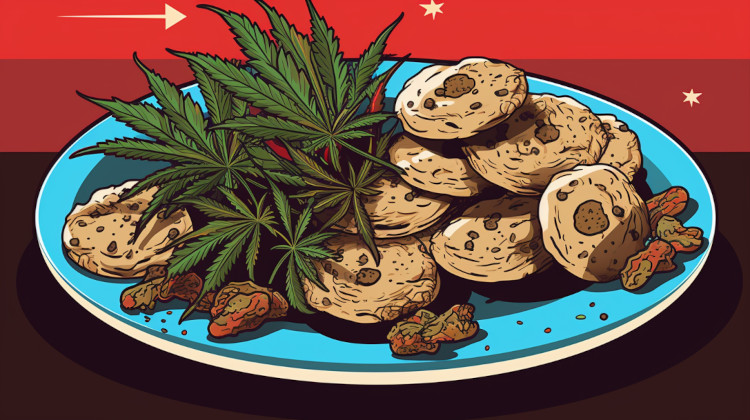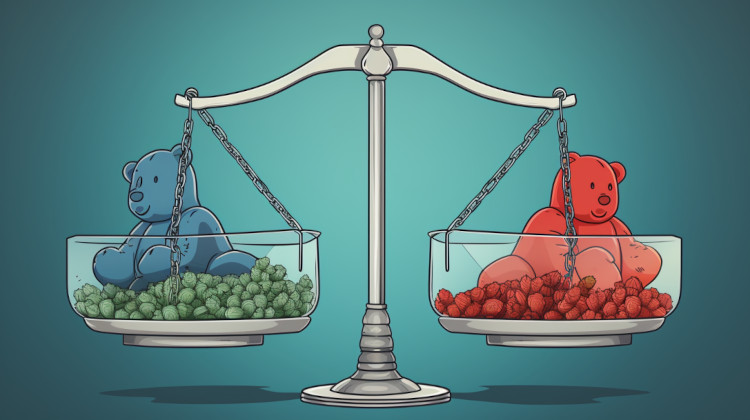In This Article
- Does Weed Have Calories?
- Does the Method of Consumption Affect Calories from Cannabis?
- Calories from Smoking Weed
- Calories from Vaping Weed
- Calories from Eating Weed
- Calories from Sublinguals
- Calories from Transdermals
- Calories in Edibles
- Can Cannabis Help You Lose Weight?
- Does smoking weed burn calories?
- Does weed make you gain weight?
- What consumption method has the most calories?
- What cannabis product contains the most calories?
- References
Cannabis in its raw form contains minimal calories, primarily due to its fibrous composition. When smoked or vaped, it doesn't contribute to caloric intake. However, cannabis-infused edibles can vary significantly in calorie content, depending on their ingredients. Understanding these differences is essential for those mindful of their dietary intake.
Does Weed Have Calories?
In a nutshell, raw cannabis plant material does contain calories, albeit in minimal amounts. However, there's a big difference between raw plant material and cannabis-infused products, such as edibles and beverages.
For the raw cannabis flower itself, the calorie content is relatively low. The plant is primarily composed of fibrous matter, which would provide a minimal caloric value when ingested.1 Keep in mind that 'ingesting' here refers to eating the plant material itself; smoking weed adds no calories whatsoever. High fiber intake is actually associated with weight loss.
On the other hand, cannabis-infused products like edibles and beverages can indeed contain a significant number of calories. These products are often formulated with additional ingredients, such as sugars, fats, and oils, to enhance flavor and potency. So, eating a bunch of edibles or drinking cannabis-infused drinks may contribute to a notable calorie intake, depending on the specific product and its ingredients.
Even so, the number of calories in cannabis-infused products can vary widely, just like any other food or beverage. Therefore, you'll need to be mindful of portion sizes and read product labels carefully to understand the nutritional information and calorie content if you want to enjoy cannabis while counting your calories.
Does the Method of Consumption Affect Calories from Cannabis?

Yes, the method of cannabis consumption can impact the calorie intake associated with its use. Take a quick look at some common ways to consume cannabis and their potential implications on weight:
Calories from Smoking Weed
When cannabis is smoked, it typically involves inhaling the smoke from the raw plant, or "bud." While the raw cannabis flower contains very few calories when eaten, smoking anything (whether it be cannabis or cigarettes) does not involve ingesting any calories. So, smoking cannabis is not a source of calorie intake at all.
Calories from Vaping Weed
Vaping involves heating the cannabis flower or concentrated extracts to release the active compounds without combustion. Like smoking, vaping cannabis does not introduce additional calories into the equation.
Nevertheless, while smoking and vaping may not directly add calories, the potential increase in appetite or cravings induced by cannabis consumption (a.k.a. the "munchies") could indirectly impact overall calorie intake if people then consume more food after getting high.
Calories from Eating Weed
Now, here's where things start to change. Eating raw cannabis flower contains very few calories. However, consuming cannabis-infused edibles, such as brownies or gummies, can increase calorie intake by a potentially significant margin. By their nature, edibles will almost always contain extra ingredients like sugars, oils, or fats, contributing to the overall calorie content. Not to mention that anything you eat will have at least some calories (the only zero-calorie food is water).
Calories from Sublinguals
Sublingual cannabis products are placed under the tongue for absorption. These products, such as tinctures or sprays, usually have minimal calorie content, as they are designed for efficient absorption without added ingredients. However, they will contain some, as they are ingested similarly to food.
Calories from Transdermals
Transdermal cannabis products, like patches or creams, are applied to the skin for absorption. Like sublingual products, transdermal options typically do not contain substantial additional calories but will include some. Some transdermal patches are even designed to aid with nutrition, similar to everyday multivitamins.
While smoking or vaping cannabis doesn't add calories, consuming edibles is different. For example, a single cannabis gummy might contain between five and 30 calories. A brownie could have upwards of 200 calories or more. Read nutrition labels and understand portion sizes to manage overall calorie consumption.
Calories in Edibles

Many people prefer to use edibles, not only for their taste but also for the unique effects of this consumption method.2 Still, this poses a challenge for those cannabis enthusiasts who are also mindful of their diets and want to watch the calories they take in.
There's no reason you can't have your cake and eat it too (pun intended); you just need to be aware of some things as you're eating edibles.
First and foremost, the calorie content of edibles is primarily influenced by the additional ingredients used in their preparation, such as sugars, fats, and oils. The potency and serving size of the edible also play a role in determining the overall calorie content. Generally, the more ingredients, the higher the calorie count.
Secondly, some edibles tend to have lower calorie content than others. For instance, mints, lozenges, or microdose candies are often designed to provide lower doses of cannabis and typically have fewer calories. These edibles usually contain fewer additional ingredients, lowering the overall calorie content.
On the other hand, baked goods like brownies, cookies, or cakes can have higher calorie content due to the use of sugars, oils, and other ingredients to enhance flavor and texture. Chocolate-based edibles and those with added nuts or fillings may also have a higher calorie count.
So, when choosing edibles, consumers should consider the serving size and potency. Always read product labels to understand the recommended serving size and associated calorie content. Especially with high-calorie treats like cookies or brownies, portion control is crucial when managing calorie consumption so you can have your cake and eat it, too.
Can Cannabis Help You Lose Weight?
As the legalization of cannabis (medical marijuana in particular) spread throughout the country, one of its purported benefits was its reported ability to help people with their weight loss goals.3
While further research is needed to understand such complex interactions fully, some studies suggest that cannabis may impact weight and potentially aid in weight loss.
For example, a 2014 study on the Inuit population found an association between cannabis use and lower body mass index (BMI).4 Specifically, "Such an association did not occur through the glucose metabolic process or related inflammatory markers." In other words, the effects of cannabis on weight were not directly tied to alterations in these specific physiological processes.
Nevertheless, other studies examining the effects of delta-9-tetrahydrocannabinol (THC), the primary intoxicating compound in cannabis, on weight gain, food intake, and fatty tissue have yielded mixed findings.5 While some research suggests cannabis may be beneficial for obesity risks in adults, others do not support such a conclusion. So, further investigation is required to understand the relationship between THC and weight management, specifically.
Finally, delta-9-tetrahydrocannabivarin (THCV), another cannabinoid found in certain strains of cannabis, has shown promise for weight management. Studies on rodents have indicated that THCV "decreases appetite, increases satiety, and up-regulates energy metabolism, making it a clinically useful remedy for weight loss and management of obesity and type-2 diabetic patients."6

Does smoking weed burn calories?
While smoking weed may temporarily increase heart rate and metabolism, smoking itself does not burn calories. However, researchers have found that cannabis use may be associated with a decrease in BMI.7
Does weed make you gain weight?
The relationship between weed and weight gain is multifaceted. Research suggests that cannabis use may stimulate appetite, often called the "munchies," leading to increased food intake and potentially contributing to weight gain. However, weight gain is not solely determined by cannabis use. It depends on various factors, including individual metabolism, dietary choices, and overall lifestyle.
What consumption method has the most calories?
Among different consumption methods, cannabis products ingested as food, such as edibles and beverages, will contain the most calories of any consumption method. These products often incorporate added sugars, fats, and oils to enhance flavor and potency, increasing their overall caloric content.
What cannabis product contains the most calories?
Within ingestible products, the calorie content can vary. Edibles like brownies, cookies, or cakes may have higher calorie counts due to the added sugars, fats, and oils used in their preparation. Infused beverages can also contribute to calorie intake depending on added sugars and flavorings. Always read product labels and consider portion sizes to be mindful of the potential calorie intake associated with specific cannabis products.
In summary, consumption method plays the most significant role in how many calories you may get from cannabis. Stay informed about the nutritional content of cannabis products you consume, especially edibles. These easy habits can help consumers make choices that align with dietary goals. As always, moderation and awareness are key.
References
- Kleinhenz MD, Magnin G, Ensley SM, et al. Nutrient concentrations, digestibility, and cannabinoid concentrations of industrial hemp plant components. Applied animal science. 2020;36(4):489-494. doi:https://doi.org/10.15232/aas.2020-02018
↩︎ - Barrus DG, Capogrossi KL, Cates SC, et al. Tasty THC: Promises and Challenges of Cannabis Edibles. Methods Rep RTI Press. 2016;2016:10.3768/rtipress.2016.op.0035.1611.
↩︎ - Sansone RA, Sansone LA. Marijuana and Body Weight. Innovations in Clinical Neuroscience. 2014;11(7-8):50-54. https://www.ncbi.nlm.nih.gov/pmc/articles/PMC4204468/
↩︎ - Ngueta G, Bélanger RE, Laouan-Sidi EA, Lucas M. Cannabis use in relation to obesity and insulin resistance in the inuit population. Obesity. 2014;23(2):290-295. doi:https://doi.org/10.1002/oby.20973
↩︎ - Fearby N, Penman S, Thanos P. Effects of Δ9-Tetrahydrocannibinol (THC) on Obesity at Different Stages of Life: A Literature Review. International Journal of Environmental Research and Public Health. 2022;19(6):3174. doi:https://doi.org/10.3390/ijerph19063174
↩︎ - Abioye A, Ayodele O, Marinkovic A, Patidar R, Akinwekomi A, Sanyaolu A. Δ9-Tetrahydrocannabivarin (THCV): a commentary on potential therapeutic benefit for the management of obesity and diabetes. Journal of Cannabis Research. 2020;2(1). doi:https://doi.org/10.1186/s42238-020-0016-7
↩︎ - Alshaarawy O, Anthony JC. Are cannabis users less likely to gain weight? Results from a national 3-year prospective study. International Journal of Epidemiology. 2019;48(5). doi:https://doi.org/10.1093/ije/dyz044
↩︎
The information in this article and any included images or charts are for educational purposes only. This information is neither a substitute for, nor does it replace, professional legal advice or medical advice, diagnosis, or treatment. If you have any concerns or questions about laws, regulations, or your health, you should always consult with an attorney, physician or other licensed professional.




